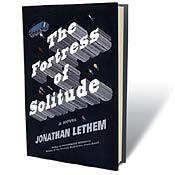
Brooklyn has always been partly a lost world: Atlantis with egg creams, a place where Hamill and Breslin forever pelt each other with spaldeens and the Dodgers are always at bat.
Could this place really have existed? Or does looking at it across the years distort it, make it sweeter, richer, more mysterious than it was? (And if so: You gotta problem with that?) Jonathan Lethem’s new novel, The Fortress of Solitude (Doubleday; $26), is built atop this question. In Motherless Brooklyn, Lethem used the borough’s anachronistic particularities as the backdrop for a comic noir detective story. In his new novel, Brooklyn itself assumes center stage, sharing it with a boy named Dylan Ebdus. As usual, Brooklyn was on its way to becoming something else. Dylan Ebdus’s parents are gentrification’s advance guard, hippieish pioneers searching for utopia, albeit of an exceedingly modest kind. Dylan’s father, Abraham, is a painter whose abstract stylings haven’t panned out, and he makes his living painting science-fiction book jackets and working on an animated film. His Brooklyn-born, pot-smoking earth mother, Rachel, wears the pants in the boho family. It is she who pushes Dylan into the mean streets—they’re one of the very few white families in Gowanus at the time—hoping to remake both the streets and Dylan.
Dylan has two doppelgängers, the poles from which he triangulates his racial identity. The black one is Mingus Rude, the son of Barrett Rude, a down-on-his-luck, free-base-head soul singer who lives a few doors down. For a white boy looking for protection in a black neighborhood, Mingus is a gift from the heavens. He’s a friend and role model, providing both protection and entrée into the Dean Street power structure, and for Dylan, their relationship can have a near-romantic intensity (lubricated, in one embarrassing moment, with Vaseline). Then there’s Arthur Lomb, a comic-book aficionado who’s figured out a million tactics for surviving on the street. When he’s about to be yoked (essentially the junior-high version—You got a dollar?—of a mugging), he fakes an asthma attack, making himself too pathetic to violate. Eventually, Lomb blends himself into the background. He’s a study in urban false consciousness—what’s currently known as a wigger—and for Dylan, a cautionary tale. Whatever Dylan is, Arthur Lomb is what he’s not.
If Dylan sometimes seems pinned to a storyboard, it’s because Lethem seems more interested in describing the contents and principles of this childhood universe than in any of its specific occupants. The tone is simultaneously explanatory and elegiac, catalogued and mythologized. The book often has an incantatory quality, thick with smoke and incense, as Lethem holds a séance for his childhood.
Sports and alcohol used to be the staples of the spaldeen set, leavened with plenty of city politics. Spaldeens are abundant here, too, but the nostalgic stew is thickened with pot, graffiti, comic books (Marvel, of course), and music. Alternative culture is something the boys can retreat into; its arcane byways and fascinating backwaters are a mirror in some ways of Brooklyn itself.
Lethem draws a big, comic-book brushstroke straight through the center of his novel: By virtue of a ring bestowed on him by a homeless man named Aaron X. Doily, Dylan can—kinda, sorta, sometimes, it seems like—fly. Armed with the ring and its highly attenuated superpower, Dylan and Mingus (in fact, it’s usually Mingus who ends up doing most of the flying) vow to remake the world in their own way by fighting crime, protecting the innocent the way Dylan’s mother had once protected him. The Hollywood-friendly plotline is stranded—by design, apparently—between loopiness and inspiration.
Just as in Motherless Brooklyn, there is a near-inexhaustible supply of surprising verbal formulations, and the book is a lot of fun to read. But for all its postmodern point-of-view shifting and time-traveling trickery, The Fortress of Solitude, built as it is on a charming if somewhat squishy foundation of nostalgia, is in many ways a more conventional book than his last one. The book constantly underlines the singularity of the Dean Street experience, which can get a little cloying. The limning is too loving.
Race is the great theme in this book, but the characters seem to be playing roles that have been predetermined. They’re acting out the stereotypes they find, yoking and being yoked. Race is both a cartoon and an unbridgeable gulf—in fact, no one after Dylan’s mother, who leaves her family mysteriously in the middle of the novel, actually wants to bridge it. Rather, the gulf is something to ponder, to moon over, a source of sadness in the world.
In Fortress of Solitude, blacks, whether they’re musicians or muggers, tend to be sentimentalized. And Dylan, as a utopian racial experiment, is largely a failure. For a time, he graduates into black leather jackets and white-boy rock, as a hanger-on of a band known as Stately Wayne Manor. Mingus Rude is left behind (though he often has Arthur Lomb to keep him company), a prisoner of the streets. “Hey, it’s not racist to find blacks earnest as hippies, broad and embarrassing as a comic book,” thinks Dylan at one point. “These boys is punks, and punks sneer. That’s what they do, deal with it.”
Almost half of the book is wistful coda—everyone is trapped by his Dean Street pasts. Dylan becomes a music journalist, writing the liner notes to a Barrett Rude compilation, acquiring a black girlfriend, maintaining a little shrine of his childhood talismans. The young black men follow the stereotypical career trajectories of poor young black men from Brooklyn. Lethem contrives to fire all the various guns that were hung on the wall in the first act, settling scores and accounts, fitting each character into an intricate master plan. But all the pyrotechnics are more like a salute to lost Dean Street than like a dramatic crescendo. You’re left wondering, as with the flying man, What happened?
Fortress of Solitude
By Jonathan Letham
Doubleday & Company, Incorporated
Buy it at bn.com.